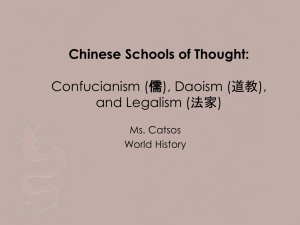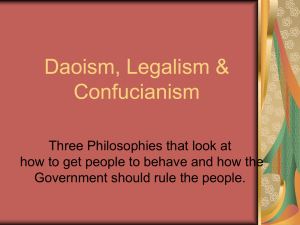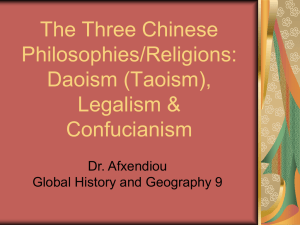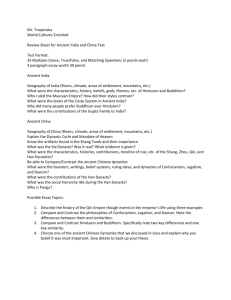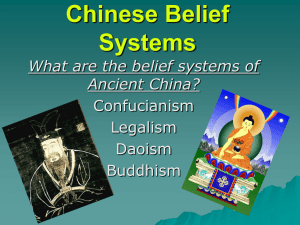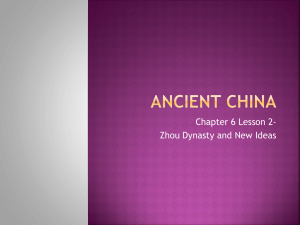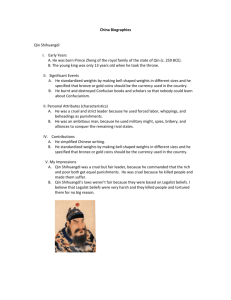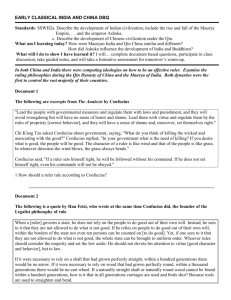Ancient China History and Philosophy Website Project
advertisement
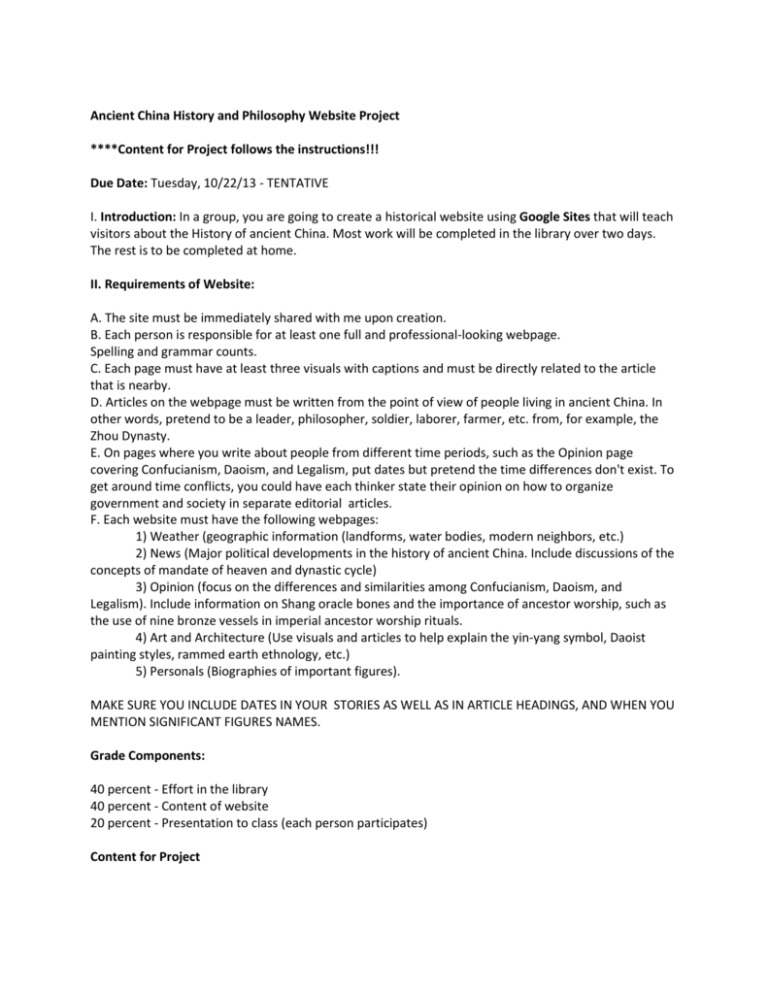
Ancient China History and Philosophy Website Project ****Content for Project follows the instructions!!! Due Date: Tuesday, 10/22/13 - TENTATIVE I. Introduction: In a group, you are going to create a historical website using Google Sites that will teach visitors about the History of ancient China. Most work will be completed in the library over two days. The rest is to be completed at home. II. Requirements of Website: A. The site must be immediately shared with me upon creation. B. Each person is responsible for at least one full and professional-looking webpage. Spelling and grammar counts. C. Each page must have at least three visuals with captions and must be directly related to the article that is nearby. D. Articles on the webpage must be written from the point of view of people living in ancient China. In other words, pretend to be a leader, philosopher, soldier, laborer, farmer, etc. from, for example, the Zhou Dynasty. E. On pages where you write about people from different time periods, such as the Opinion page covering Confucianism, Daoism, and Legalism, put dates but pretend the time differences don't exist. To get around time conflicts, you could have each thinker state their opinion on how to organize government and society in separate editorial articles. F. Each website must have the following webpages: 1) Weather (geographic information (landforms, water bodies, modern neighbors, etc.) 2) News (Major political developments in the history of ancient China. Include discussions of the concepts of mandate of heaven and dynastic cycle) 3) Opinion (focus on the differences and similarities among Confucianism, Daoism, and Legalism). Include information on Shang oracle bones and the importance of ancestor worship, such as the use of nine bronze vessels in imperial ancestor worship rituals. 4) Art and Architecture (Use visuals and articles to help explain the yin-yang symbol, Daoist painting styles, rammed earth ethnology, etc.) 5) Personals (Biographies of important figures). MAKE SURE YOU INCLUDE DATES IN YOUR STORIES AS WELL AS IN ARTICLE HEADINGS, AND WHEN YOU MENTION SIGNIFICANT FIGURES NAMES. Grade Components: 40 percent - Effort in the library 40 percent - Content of website 20 percent - Presentation to class (each person participates) Content for Project I. Xia Dynasty (c. 2000 - 1600 B.C.E.) - This is the first dynasty mentioned by Sima Qian, who wrote Records of the Grand Historian. This text provides us with important biographies of the leaders of China's earliest dynasties, the Xia, Shang, and Zhou dynasties. A. Xia emperors used nine bronze vessels (ding) to worship their ancestors. Ancestor worship was the basic religion of ancient China. B. They lived along the Huang He River in northern China. They farmed, made glazed pottery, and bronze vessels, such as the ones used in ancestor worship rituals. C. Their palace at Erlitou was made using rammed earth technology. D. They also learned how to harvest silk to make fine cloths. II. Shang Dynasty (c. 1600 to 1045)- This was the first dynasty to use writing. A. They used oracle bones to predict the future. China's earliest form of writing is on these oracle bones. A hot poker was then applied to them. Diviners decided whether the ancestors answered yes or no based on the cracks that resulted. B. They also took possession of the nine bronze vessels used by Xia emperors in ancestor worship rituals (ancestor worship was the religion of ancient China). Performing these rituals with these bronze vessels (ding) was one way Shang leaders showed that they were legitimate rulers. Future dynasties followed the example of the Shang. III. Zhou Dynasty - This was the first dynasty to use the idea of mandate of heaven to justify its takeover of China. Mandate of heaven refers to an impersonal moral force that shapes events on earth. In high school, we usually say it means the "approval of the gods." A. Early during Zhou rule, the empire became divided into 200 kingdoms ruled mostly by blood relatives of the emperor. These were somewhat independent from imperial rule. Over time, the number of kingdoms decreased to 100. B. During the Spring and Autumn Period (722 - 479 B.C.E.), the number of kingdoms shrunk from 100 to 40. This period was characterized by assassinations, overthrows of governments, wars, civil wars, and a general feeling of mistrust. Confucius was born near the end of this period (551 B.C.E.), as was Laozi (the founder of Daoism), and Han Feizi (the founder of legalism). Check the philosophy section for more information on Confucius. IV. Qin Dynasty (221 - 206 B.C.E.) - Qin Shihuangdi unified China by conquering seven neighboring kingdoms. He turned China into a strong, centralized state that ran according to legalist principles (See philosophy section for more about legalism). A He ordered the use of a single writing system for all of China (there are multiple spoken languages). It is the basis of the written language Chinese use today. B. He ordered the construction of a single "Great Wall" from a number of preexisting walls built by earlier kingdoms in northern China. He ordered its construction to protect China from attacks in the north. C. He established standard weights, measures, and laws. This further helped to unify China because it facilitated trade, record-keeping, and the carrying out of laws. D. Several assassination attempts helped lead him to become a brutal ruler who adopted legalist policies. E. Legalism is the belief that a government should create a detailed law code that rewards people for obeying the law and punishes them severely for disobeying the law. F. Legalists dislike scholars because they look to the past for ideas about government and society, ideas which might threaten a legalist ruler. Qin Shihuangdi was a legalist and had suffered many assassination attempts. As a result, it's no surprise that he killed many Confucian scholars (more than 400 in one day alone) when he felt that his rule was threatened. G. Qin Shihuangdi tried to make himself immortal by drinking elixirs (curing potions) made with mercury. He eventually died because of it. His death was initially hidden. While it was hidden, his chief eunuch and prime minister sent a message to his oldest son telling him to kill himself. He did. The son who eventually became emperor was incompetent, and the empire soon fell. H. Before he died, Qin Shihuangdi had a huge tomb built that included thousands of terra cotta soldiers and other objects associated with the Chinese army. He wanted this army to protect him in the afterlife. V. Han Dynasty (202 B.C.E. to 220 C.E.)- After a four-year civil war, Liu Bang, formerly a peasant, became the first emperor of the Han Dynasty. He was one of only two peasants to rise to the position of emperor. A. Liu Bang's successors used the civil service examination system to choose qualified people for government jobs. This system was based on the ideas of Confucianism, which they made the state ideology. Students were tested mainly on their knowledge of the Confucian Classics. This system was used up until the last emperor was forced to give up his throne in 1912. VI. Several ancient Chinese philosophies had an enduring (long-lasting) impact on East Asian cultures. We call them the three great ancient Chinese native philosophies. A. Confucianism was based on the ideas of Kongzi (Master Kung). Westerners called him Kong Fuzi, which they turned into Confucius. 1. Confucius lived from 551 - 479 B.C.E. (at the end of the Spring and Autumn Period of the Zhou Dynasty (1045 - 256 B.C.E.). As mentioned earlier, this was a period of social disorder, assassinations, overthrows of government, and warfare (including civil wars). There was a general sense of distrust in government. 2. Confucius eventually got a job as a high level government official but wasn't able to convince the provincial ruler he worked for to fully implement his ideas. So he spent the rest of his life teaching. By the time he died, he was somewhat depressed because no ruler had implemented his ideas. Also, his son and his favorite student had died before him. 3. Confucius' ideas made him famous after he died. Many scholars argue that he is the most influential philosopher in Chinese history. 4. His writings were written down by his students in the Analects (Conversations). 5. Though he believed that people had an innate (inborn) goodness, he also argued that people had to be taught moral behavior (moral cultivation). As a result, he believed education was extremely important to a harmonious society and government. 6. Confucius believed that people were not independent beings. Instead, he argued that they were part of an interconnected web of social relationships. In other words, their behavior in their various roles in society affected the rest of society. At the core of this web of relationships were the Five Constant Relationships: a. Ruler and Subject b. Husband and Wife c. Father and Son d. Older Brother and Younger Brother e. Older Friend and Younger Friend 7. Three of the Five Constant Relationships are family relationships. Confucius believed that people properly fulfilling their roles in the family was crucial to the moral development of all of society. 8. Confucius stressed the idea of reciprocity. There is a give and take between the superior and subordinate in each of the Five Constant Relationships. A father, for example, supports and feeds his son, and makes important decisions that protect the son's interests. In exchange, the son agrees to listen to his father's advice, support him in his decisions, and take care of him in his old age. Confucius stated his own version of Jesus' "Golden Rule" five hundred years before Jesus Christ. He said "Do not do unto others what you would not have them do unto you." 9. Filial piety generally refers to respecting one's parents. It was an important Confucian idea and is still an important characteristic of East Asian culture today. In ancient times, one mourned a parent for three years after he/she died. One was expected to follow a parent's advice for three years after their death as well. 10. Confucius didn't believe in forcing people to behave morally. Instead, he believed it was much more important for people (including rulers) to lead by example. Confucius emphasized the performance of rituals (li) as an important way to lead by example. Confucius explained the importance of a ruler leading by example by saying that a ruler is like a wind and the people are like grass. . 11. How would you organize society so it aligns with Confucian ideals? B. Daoism - This philosophy focuses on living in harmony with the Dao (nature, or the natural order of the universe). 1. It is based on the ideas of Laozi (The Old Master). 2. He is said to have written the Dao de Jing (Way of Power), the foundational book of Daoism. 3. According to Laozi, one must live in harmony with nature. This means to avoid disturbing the natural order of things as little as possible. For example, don't build a dam or even have too big a government. 4. The best way to live in harmony with the Dao ("Way") was to live a life of inactivity. This didn't mean total inactivity, but might involve withdrawing from public life as much as possible and not going to extremes (don't go for #1, go for #9 or 10). Daoists believe that going to extremes results in a severe backlash from the opposing side. 5. Government officials, therefore, should do as little as possible so as not to disturb the Dao. 6. Not going to extremes results in the balance of opposites, an extremely important idea in much of Asian philosophy. It is represented by the yin-yang symbol. Balancing opposites restores harmony. This idea of balancing opposites to restore harmony is behind acupuncture and feng sui, two examples taken from modern Chinese culture. 7. There are famous Chinese Daoist paintings that depict majestic landscapes. In those paintings, humans are depicted as very small. C. The Art of War and Legalism 1. Sunzi wrote the Art of War. It called for moving away from honorable fighting on the battlefield to a more deceptive strategy. Hargued the following: a. Act in unorthodox and surprising ways. b. Attack when your enemy is weak. c. Pretend you are strong when you're weak. d. Take advantage of terrain (situational advantage). e. Keep wars as short as possible (if possible don't fight at all). f. Damage lands you are conquering as little as possible because you are trying to conquer them. 2. Legalism's main goal was to make the state successful at war. To do this, you had to create a harmonious society. a. Han Feizi - His ideas became the basis of Legalism: b. He believed farming was important because it is productive and feeds army. c. He believed that scholars, merchants, and manufacturers of luxury goods were potential enemies of the state.

